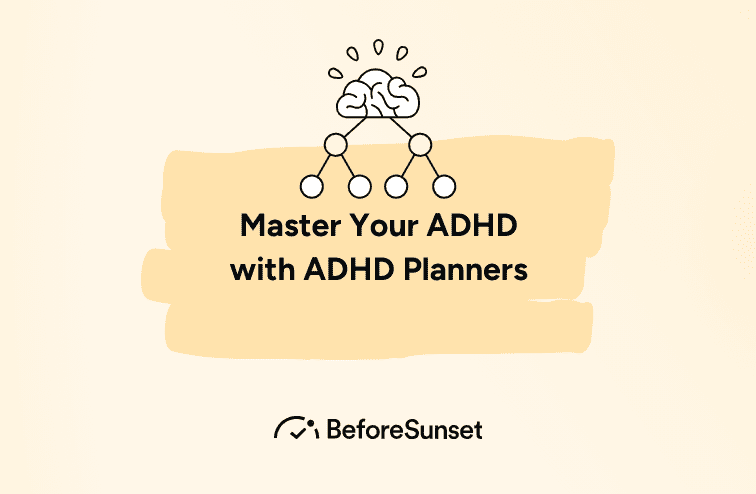In a world that often demands meticulous planning and unwavering focus, a significant number of individuals grapple with the unique challenges presented by Attention Deficit Hyperactivity Disorder (ADHD). The constant juggling of tasks, the struggle to maintain focus, and the ever-present distraction make traditional planning tools seem inadequate.
You might also like:
ADHD impacts approximately 8% of adults globally, with symptoms affecting their daily routines, ability to prioritize daily tasks, and complete long-term goals effectively.
A comprehensive planner with advanced tools can significantly assist in establishing routines, organizing tasks, and fostering healthy habits. Here’s how you can make the most of an ADHD-friendly planner and why a tool like BeforeSunset AI could be the perfect companion for creating structure and achieving goals.
Why ADHD-Friendly Planners Make a Difference
Whether you’re using a digital planner, paper planner, or an advanced AI tool like BeforeSunset AI, planners help bridge the gap between ideas and actions. Here’s what an ADHD-friendly planner should include:
Ease of Use with Visual Engagement
Opt for bright colors and simple layouts that clearly outline daily tasks, to-do lists, and habit trackers.
AI tools like BeforeSunset AI further simplify this process, dynamically adjusting layouts and offering personalized reminders to keep you on track.
Robust Time Management Tools
For ADHD, planning isn’t only about lists; it’s about blocks of time for weekly planning, breaking goals into manageable steps, and reinforcing routines.
BeforeSunset AI offers pre-set time management methods that you can select daily, making it easy to adapt based on your energy and focus.
Flexibility to Adjust Plans
An ideal planner for ADHD should allow changes and flexibility. With BeforeSunset AI, all plans are adaptable, from daily planning sessions to longer weekly and monthly calendars.
Types of ADHD Planners
Selecting the right planner can depend on your lifestyle and needs. Here are three planner types designed with ADHD needs in mind, including how BeforeSunset AI stands out in each category:
Digital Planners
Digital planners like BeforeSunset AI cater to people on the go. Features include syncing to-do lists and calendars, making updates easy, and even offering an option to plan your day with AI.
Advantages: Streamlined layouts, adaptable schedules, and tools like habit tracking and customizable daily to-do lists. BeforeSunset AI also lets you track progress in real-time for quick adjustments.
Physical Planners
Traditional paper planners and bullet journals can provide grounding and focus for ADHD individuals, helping them feel organized with bright colors and inspirational quotes.
Advantages: Tactile interaction, customizable designs, and a wide range of formats that let you outline your daily plans and routines physically.
AI-Integrated Planners
BeforeSunset AI combines technology with personalization, enabling you to plan everything from your entire life to everyday life routines. With features like the “Eat the Frog” method (which starts the day with the toughest task) or “Quick Wins” (which lists easy tasks first), it’s designed for flexibility and adaptability.
Advantages: Smart algorithms that plan your day in blocks of time, task prioritization, and customizable methods to keep your day productive.
Why BeforeSunset AI is an Ideal ADHD Planning Tool
With ADHD, you may feel overwhelmed by the thought of organizing an entire day. BeforeSunset AI offers various methods tailored to ADHD needs, such as the “Task Variety” method that mixes different types of tasks to avoid monotony or “Smart Balance” for balancing due dates and priorities.
Here’s how BeforeSunset AI’s features make a difference:
Guided Daily and Weekly Planning
The tool starts with your to-do list and daily routines, analyzing your schedule and suggesting manageable steps. This way, BeforeSunset AI does the planning for you, reducing decision fatigue.
AI-Powered Day Planning
Through a one-click “Plan My Day” feature, you can choose one of five effective planning methods that fit your mood. Options like “Batch Similar Tasks” streamline your planning process by grouping similar tasks for optimal focus.
How it Works:
Write down your tasks and add context using tags like “work” or “personal.”
Set the planned time or let the AI analyze it for you.
Choose its priority level, and let BeforeSunset AI arrange your day seamlessly.
Flexibility and Lock Feature
If there’s a task you want at a specific time, simply lock it in. The AI will keep it in place while optimizing the rest of your schedule. This is ideal for essential routines or blocks of time that are set in your weekly planner.
ADHD-Specific Planning Techniques with AI
BeforeSunset AI offers five planning techniques, each designed for specific ADHD needs:
Eat the Frog: Start your day by completing the most challenging task first.
Batch Similar Tasks: Group similar tasks to maintain focus and minimize cognitive load.
Quick Wins: Begin with smaller, manageable tasks to gain momentum.
Task Variety: Mix task types to prevent boredom and burnout.
Smart Balance: Balance tasks based on deadlines and priorities.
Living with ADHD: A Case from Real Life
Mia, an energetic and creative graphic designer with adult ADHD, thrives in her fast-paced, colorful world of design. Though she’s deeply passionate about her work, organizing her day and staying focused can feel like trying to catch leaves in the wind. One particular morning, she was determined to conquer her to-do list. With her coffee steaming beside her, she had her day perfectly planned—until a single notification shifted everything.
A quick text from a close friend pulled her into a new, unplanned project. Her friend needed last-minute design help, and Mia, always eager to lend a hand, set her priorities aside in an instant. Soon, she was entirely absorbed in this unexpected work, her original list forgotten as she got lost in the flow of creativity. Hours passed, and she loved every moment, but the clock was ticking, and her carefully laid-out plans were becoming buried under the excitement of the new task.
As afternoon arrived, Mia checked her watch and realized with a shock that half the day had slipped away. Panic set in as she saw her to-do list untouched, her weekly planner now cluttered with postponed tasks. She thought of shifting gears and diving back into her original plans, but the day was already slipping by. Her energy waned as the hours stacked up, yet the workload remained, a mix of tasks left undone. Each postponed item felt heavier than the last, and Mia wondered how she’d ever catch up.
ADHD often creates this kind of “lost time” for many adults, where one distraction or spontaneous change can reroute an entire day. For Mia, the challenge was more than just a missed deadline; it was the familiar struggle of balancing spontaneity with the desire to create structure, all within the same chaotic day.
Conclusion
Finding the perfect planner that fits seamlessly into your life is key to managing ADHD. While BeforeSunset AI takes the experience to a new level with AI-driven customization, it offers tools to support daily plans, habit tracking, and weekly planning in a way that matches your unique needs.
With its range of adaptable features, BeforeSunset AI is an invaluable tool for adults with ADHD, empowering you to create an organized, productive life.



